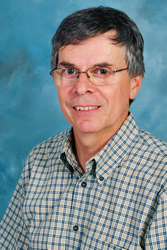VIMS professor elected vice chair of federal advisory committee
Professor Robert Diaz of the Virginia Institute of Marine Science has been elected to a three-year term as vice chair of the Outer Continental Shelf Scientific Committee, an advisory group to the federal Bureau of Ocean Energy Management.
BOEM—part of the reorganization of the former Minerals Management Service following the Deepwater Horizon oil spill—is tasked with managing the exploration and development of petroleum and renewable resources in the nation's offshore waters.
 Interior
Secretary Ken Salazar named Diaz to the committee in October 2011 in
recognition of his expertise in the biology of deep-sea communities and their
ecological interactions with underlying sediments. The election of Diaz as vice
chair took place during the committee’s most recent meeting on February 8th
and 9th in Reston, Virginia.
Interior
Secretary Ken Salazar named Diaz to the committee in October 2011 in
recognition of his expertise in the biology of deep-sea communities and their
ecological interactions with underlying sediments. The election of Diaz as vice
chair took place during the committee’s most recent meeting on February 8th
and 9th in Reston, Virginia.
BOEM Director Tommy P. Beaudreau says “As we continue to develop and diversify offshore energy sources that benefit the American people and the economy while protecting the environment for future generations, the service of these committee members is highly valued and adds immensely to our scientific focus.”
The OCS Scientific Committee advises BOEM’s Environmental Studies Program, which predicts, assesses, and manages environmental impacts from activities associated with the exploration, development, and production of offshore energy and mineral resources. Program scientists operate in relation to the Energy Policy Act, the Endangered Species Act, the Marine Mammal Protection Act, the Clean Air Act, the Magnuson-Stevens Fishery Conservation and Management Act, and the Clean Water Act.
Diaz first worked on issues related to offshore resources during investigations of sand deposits on Virginia’s continental shelf during the early 1990s. These deposits are mined for beach replenishment in the Commonwealth. He conducted his first deep-water, energy-related studies during exploratory oil and gas activities off Cape Hatteras in 1993.
Diaz has been involved in a number of studies related to oil and gas activities in the Gulf of Mexico, beginning in the early 2000s when the petroleum industry began its large-scale expansion into the Gulf’s deeper waters. His early studies focused on how drilling muds and well cuttings might impact bottom-dwelling organisms. In 201o, he briefed Congress on issues related to the use of dispersants during the Deepwater Horizon oil spill, and he is currently using seafloor cameras to study the spill's long-term effects on the Gulf and its marine life.
The OCS Scientific Committee consists of 15 distinguished scientists representing diverse scientific fields. During the recent meeting, committee members also elected Dr. Lorrie Rea of the Alaska Department of Fish and Game as chair, and Dr. Stephen L. Elgar of the Woods Hole Oceanographic Institution as parliamentarian.

